When Dancing Takes on Politics in POP DEMO
6 Degrees Artistic Director Toni Leago Valle explores the three-ring circus that is contemporary politics in her latest show, POP DEMO, which runs through September 23 at the MATCH (3400 Main Street). The show’s characters are rendered as political cartoons who inhabit a 1920s-style speakeasy; Travis Prokop as Monsieur Ballista preening at the entrance reinforces the promise of a raucous good time served with a side of political inquiry. I can’t say that I found either within the colorful walls of POP DEMO.
Valle, a skilled producer whose Never Again (2018) was a glittering, entertaining gem, opts to avoid the complexity of political discourse and throw back to the audience much of the culture wars noise that continues to warp the senses of the American public. This is meant to be revelatory, but as someone who has experienced and processed the trauma of the news headlines blasted across the projection walls, I could not figure out why I was being asked to relive them in an artistic format. I loved the stylized design elements, but I felt the costumes, make-up, and set were asking for a bit more of the central conceit. We are in a speakeasy, after all.
Carlos Perez as Mr. Pops, the POP DEMO club owner, gets the assignment. He takes the one-dimensionality of the villainous propaganda machine and stretches it to the limit of excess. He has crafted a deliciously hateful character. His Mr. Pops is part HIM of Powerfulf Girls notoriety, part Miranda Priestly, part Cruella De Vil, and completely a star vehicle for his distinct stage persona. He’s a pretty smart actor, knowing precisely just how to address the audience when his entrance was interrupted by the sound of a cell phone going off.
Michelle Reyes makes a compelling counterpart as the stoic, chainbound Lady J. (shorthand for Lady Justice). The imagery of her first sequence, with silks framing her contorted shapes and projections of her personage shimmering off of them, speaks more to the precariousness of her situation in the real world than any of the grandstanding vignettes that follow. Aside from Reyes, Mia Pham is the only other woman who delivers a fully realized performance as Madame Bribe,’ Lady J.’s chief antagonist.
My main problem with POP DEMO is that much of the content is rendered in the same media frenzy rhetoric that the show purports to disrupt. What is more interesting to me in our political reality are the nuances that this work effectively shuts down.
For example, the conservative supermajority of the Supreme Court are depicted in the projections with simple disdain. And, yes, anger and frustration are appropriate in regard to a body of justices who seem hell bent on undoing decades of progressive reform and remaking constitutional law at lightning speed. But acknowledgement of nuance is necessary.
We cannot sidestep that earlier this year three of the conservative justices joined the three liberals on the bench in rejecting the independent state legislature theory, which, if advanced, would have authorized state legislatures to create their own federal election rules free from judicial review. In a 7-2 ruling, the court also upheld the Indian Child Welfare Act, which gives priority adoption of Indigenous children to members of the same tribal nation. The majority opinion was written by conservative Justice Amy Coney Barrett, herself an adoptive parent of two Black Haitian children. The affirmation of tribal sovereignty in this country is no small thing. And in an even bigger surprise, the Supreme Court upheld Section 2 of the Voting Rights Act in a 5-4 decision, ruling that Alabama’s congressional map purposefully diluted the state’s Black vote and would have to redraw it with a second Black majority district. The three liberals were joined by Chief Justice John Roberts and Justice Brett Kavanaugh.
Don’t get me wrong. The future of progressive policies in this country is bleak, but the fact that the six conservative justices, three of them appointed by Trump, are voting differently in select cases should inspire a silver lining sensibility that they are not bulldozing the liberal wing as a block. There is no acknowledgment of this in POP DEMO.
Perhaps I could have gotten through the barrage of infuriating headlines if there was choreography to support the central thesis. But in a section devoted to the onslaught of mass shootings, many of them in public schools, all we are offered is the sounds of terrifying gunshots and bodies on the floor. Prokop’s dazzling dancing promises to provide a human element amongst the carnage, but his solo peters out before he can save us. I teach at a local community college. Many of my students are dual credit high school students. I have seen the interview of a man whose child was murdered at Uvalde. I saw how his body crumpled inward, how he was broken, breaking, will break for the rest of his life. In the theater of MATCHBOX ONE, all I had was an assault of the senses without any real pathos for the subject matter.
On the matter of the Supreme Court, Justice Ketanji Brown Jackson makes a prominent appearance in POP DEMO. In this context, with adulatory praise projected behind dancer Tempest McLendon, she is placed as a hero of a threatened liberal ideology. Again, this is only a part of a larger, more complex narrative. Justice Ketanji Brown Jackson’s freshman year revealed her to be a champion of the true working-class, a huge swath of the American public that liberalism has failed to understand and reason with in recent decades. We cannot forget Jackson’s courageous dissent against the entire court, including fellow liberal justices Kagan and Sotomayor, in Glacier Northwest v. Teamsters, arguing that the unions have a right to strike, even when doing so has a negative economic impact on the employer.
McLendon, a skilled performer, is asked to depict Jackson as a sort of sly, impish card dealer with just a hint of the vixen archetype. Her solo references the cheeky, flirtatious movement of the trio that precedes her, and she fills the stage with a mischievous and cunning presence. I think the direction here was misguided. This is no way to represent the woman who history is shaping to be perhaps the most compelling dissenter on the court of this generation. And to reimagine a Black luminary in such an irreverent way reads as tone-deaf to me.
Near the end of the show, I was looking at Mr. Pops as a savior figure. His performance felt layered to me in a way that revealed the ugly truths of American capitalism and media saturation in a more direct, meaningful way. It will have me looking at each of the names on the November ballot with a second glance, to make sure there is not a hint of Mr. Pops in my choices.
For dancing that is supposed to be happening in a speakeasy, there’s not a lot of convincing sensuality. This is a quality that really can’t be learned by just going across the floor. Prokop has this in spades and is smashing to watch. His movement is fluid and filled with life and joy and the magic of real artistry. He’s the primary reason the male duet is successful, and I wonder if he could not have been showcased in a more prominent role.
I left MATCH in a daze of recycled feelings of anxiety without perspective. And perspective is what I have found myself returning to more and more in recent months. I find this in my students. There are moments of wonder happening in the liminal space of living in a blue metropolis in a deeply red state. I think of my transgender student Diane, who walked into class with an ethereal composure. Dressed in medical scrubs, she was diligent and committed, writing about her husband and their home and dreams of the future. She has found a sense of place and prosperity in a state that is unkind to her identity, but she is anchored, unbothered. I think of Shalise, a young Black woman who moved to Texas at the start of the pandemic from California, and how she felt it was the best decision of her life. Things are a little weird here, she admitted, but at least she could buy a house after only two years here for her little girl to grow up in. Around the same time, I recall a Lyft driver, also a Black woman who had moved here from California, refer to Texas as the land of milk and honey. She can live and work comfortably. Anything is possible here, it seems.
Perspective is what I need. Perspective is how I am surviving. The culture wars cycle that POP DEMO perpetuates doesn’t quite feel three-dimensional to me. I have students, young Black and brown kids, who seem unfazed by the recent demolition of affirmative action, and seem eager and ready to test their mettle against an often uncompromising system. And where is the understanding that the Rio Grande Valley, a previous Democratic stronghold, is growing redder with every election cycle. This mirrors national trends among Latino communities, perhaps an indication that they have become disenchanted with a movement that dismisses their conservative values as backward and unlearned. Tumult is in the air. Just earlier this summer Black Georgia state legislator, Representative Mesha Mainor, switched to the Republican Party after she was publicly lambasted by her Democratic colleagues for her support of a school voucher bill. So much for celebrating differences of opinion.
And I don’t think my opinion matters a whole lot, not when everyone in the crowd seemed to enjoy the show just fine. But I have to say, I suspect that the arts crowd at the MATCH is probably the proverbial choir that is being preached to. For me, POP DEMO lives in the kind of liberal bubble that lends itself to implosion. It’s not a far leap to think that this may be how we got here in the first place.

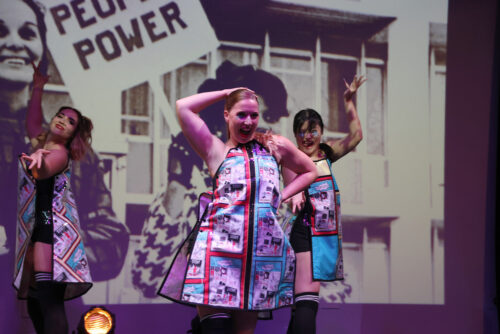
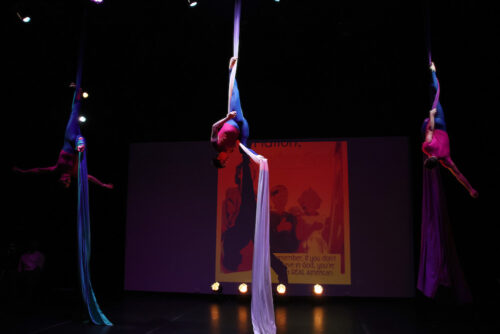
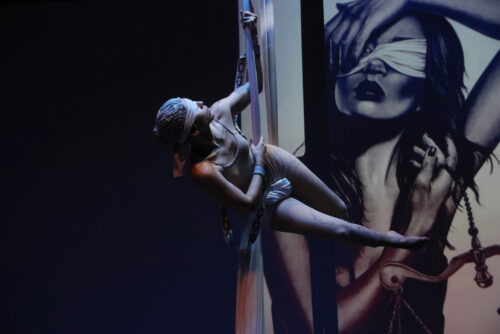
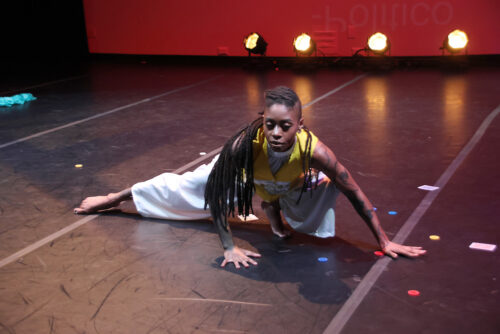
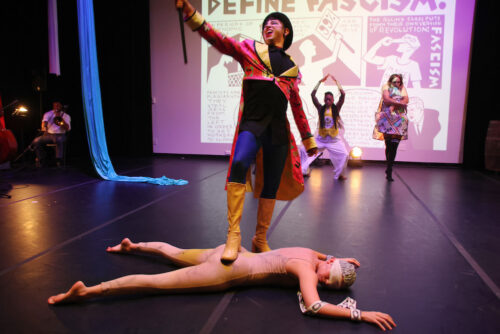
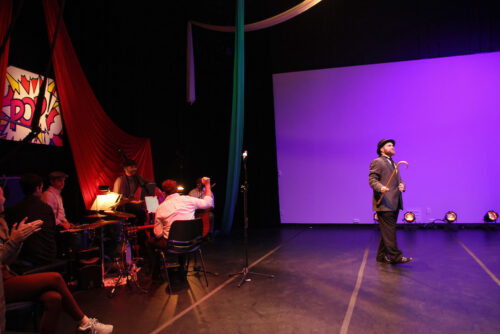


Recent Comments